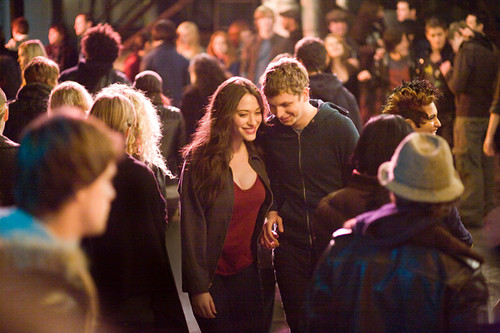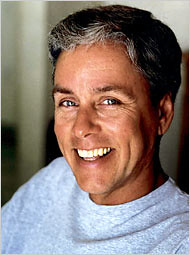
Last week, I promised my final thoughts on Nick and Norah's Infinite Playlist and perhaps some Ellroy. Well, I got my dose of Ellroy when I watched Street Kings on Saturday (I even started re-reading L.A. Confidential, but decided to table that reunion) and decided to try a new author: Carl Hiaasen. More on him later.
Nick and Norah is a relatively quick read. Since it's a YA novel, it's not a remarkably challenging book to read, either. Still, the authors (who took turns writing chapters, one focusing on Nick the other on Norah, rinse, repeat) manage to make the characters believable and interesting enough for any reader. My impetus to read the book came from seeing the movie, which, in retrospect is a stronger piece of entertainment with the book. If you don't want aspects of the film or book "spoiled," I'd suggest scrolling down past the Hiaasen book cover. Gone? OK.
The book is hampered by its structure. Sure, it's cool that every other chapter focuses on Nick or Norah. It's -- dare I say it -- a novel approach to the writing of a book. But sometimes novelty interferes with quality. Unlike the movie, which is free to roam around and interact with many of the other, sometimes more interesting supporting characters, the book forces the reader to either reside in Nick or Norah's head. One of the funniest characters in the movie is Norah's boozer best friend, who is quickly written off in the book and never seen again, much to my dismay as I reached the last few chapters. Also, the movie moves toward a goal -- the mysterious, secret show of indie rock darlings Where's Fluffy?. In the book, the concert happens early on, and you're left wondering why this band is so cool. In the movie, you're strung along so capably by the characters' excitement that you find yourself almost believing how awesome this band could be. I'll save the movie's ultimate band-related plot twist, but needless to say, the film deals with the mythic nature of the band in a much more creative and pleasing way.
Now, I understand -- the book came first, so of course the film is able to talk the novel as a first draft and therefore improve upon it. I get it. Maybe if I'd read the book first, I would have had more qualms with the film. Somehow I doubt it, though. Also worth noting is that Norah is not nearly as sweet in the book as she is in the movie, where she's portrayed as awkward and shy. Which is an improvement. While I ended up liking Norah's character in the movie, I found the book's version to be more realistic and charming. She was more flawed and confused -- like a real teenager.
Would I have read the book had I not seen the movie? I don't think so. Do I regret reading the book? No way. It was well-written and, I think, an effective story for the kind of genre it's looking to be filed under. Strong dialogue, good scene-setting and two interesting leads make for a quality piece of work. But I liked the movie better. So sue me. At least I didn't title this post "A little more-a Nick and Norah."

Now, I'm about a third of the way done with Carl Hiaasen's Basket Case. Being a former journalist from Florida like the author, I've always felt an affinity toward Hiaasen, and he's been on my shortlist of writers that I want to check out. Now, I buy books in bulk. I bought Basket Case last December, thinking that I'd need a lot of reading material to survive being holed up in my mother's house for almost a week on vacation. I never got around to the book, but after finishing N&N on Saturday, I knew I wanted something crime-ish, but not as dour or deadly as an Ellroy, Connelly or Pelecanos book. Enter Hiaasen.
Two other, more clear reasons why Hiaseen is a good person for me to read now: he writes about South Florida. The protagonist of this book is a journalist. If you know anything about SILENT CITY, you know that a) it's set in Miami and b) stars a jaded journalist. So, like Connelly's Chasing the Dime, which I discussed here, Basket Case is not only a means of entertaining myself through a good story, but a great way to learn a thing or two from an author who's made a career out of writing about SoFla and about crime.
Basket Case's protagonist is Jack Tagger, a former star investigative reporter now relegated to the obituary section of his local daily. When Tagger stumbles upon the death of Johnny Stoma, famous ex-lead singer of punk rock legends The Slut Puppies, Tagger sees his ticket out of the doghouse and onto the front page. But when things start to smell a little fishy and Stoma's death doesn't exactly jibe with the police report screaming "accident," Tagger realizes he's in a little too deep.

If Pelecanos is literary crime fiction and Connelly redefines the procedural, Hiaasen finds a way to inject a believable and, admittedly, enjoyable dose of humor into the genre. Tagger is a cranky, unhappy and almost pathetic lead, but as a reader I don't tire of reading about him and in fact find myself drawn to him as a character. Hiaasen clearly knows the area and the inner workings of the newspaper, making everything he writes seem believable, cutting down on any "Wha? Huh?" moments that would otherwise disconnect the reader from the story.
I'll admit, though, that I find the musical references -- specifically, the band's name and the exaggerated characterizations of the music biz folk that flicker in and out of the book -- a little cringe-worthy, but aside from that, Basket Case has proven to be a breezy, enjoyable and just plain fun read. Too bad I'm not on a beach sipping a margarita. Can't win 'em all. Enough about me. What are you reading?





